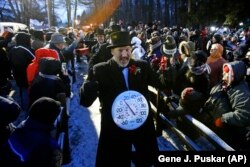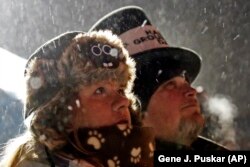North America will have six more weeks of winter, says “Punxsutawney Phil,” the most famous groundhog in the United States.
Phil’s keepers reported his weather prediction Friday morning on the U.S. observance of “Groundhog Day.”
Every year, on February 2, a groundhog leaves his home, a hole in the ground in the small community of Punxsutawney, Pennsylvania. On a sunny morning, his body will create a shadow on nearby objects. Tradition says that if the animal sees his shadow, there will be six more weeks of winter weather. But if skies are cloudy, and no dark shape appears, Americans can expect spring to arrive early.
An unusual tradition
Groundhog Day is one of the more unusual American traditions. Every year, thousands of people from across the U.S. travel to Punxsutawney. On the night of February 1, they go to a hill called “Gobbler’s Knob." There, they wait until sunrise, when Phil leaves his home to look for his shadow.
Groundhog Day is said to come from a European tradition called “Candlemas.” February 2 was the middle of winter, and in Europe, clergymen would give candles to people at religious services. When lit, the candles brightened up the community in the dead of winter.
Later, in Germany, the tradition changed, and people instead began looking for signs of increased sunlight and changes in the weather. If an animal saw its shadow on Candlemas Day, this meant six more weeks of winter, or the “Second Winter.”
The tradition came to North America when German immigrants arrived in what is now the eastern state of Pennsylvania. They chose the groundhog, a large rodent and member of the marmot family, as the animal to continue the tradition.
The first official Groundhog Day at Gobbler’s Knob was held in 1887. The event has continued there ever since.
Part of American culture
Groundhog Day has become part of American culture. Other states now celebrate their own Groundhog Day, with their own groundhog. In North Carolina, his name is Sir Walter Wally. In West Virginia, people turn to French Creek Freddie. Georgia has General Beauregard Lee.
New York City also marks the day with Chuck the groundhog. In 2009, Chuck famously bit the hand of the city’s mayor at the time, Michael Bloomberg, when he came out of his home.
Washington, D.C., has a small tradition involving a stuffed groundhog. Some people use the animal to make predictions about the “political climate” of the country.
Aaron DeNu told The Washington Post newspaper that every year his groundhog predicts “six more weeks of political gridlock…and so far, he’s always been right.”
Groundhog Day has also been popular in American media. In the 1993 film “Groundhog Day”, a reporter visits Punxsutawney for the big event, but becomes stuck in time. He then has to repeat the same day, over and over again, until he becomes a better person.
Can animals predict the weather?
Although Americans hear Phil’s weather prediction every February 2, it is not clear how correct the groundhog is.
The Stormfax website researched all the predications since 1887 and found that he has seen his shadow 104 times (79 percent). Yet the animal has been right only 39 percent of the time.
However, his record does not ruin the excitement of people who travel to see him.
Doug Sacrison traveled over 4,000 kilometers from Washington State this year to attend his first Groundhog Day in Punxsutawney. Sacrison said that he finally has “lived a lifelong dream.”
“I think Groundhog Day may be my single favorite part of America,” he said. “It’s all just for fun… and there’s something magical about getting excited about something that silly. I think it was the coldest temperature I had ever stood in, but the fun of it all kept me warm and smiling well after Phil made his prediction.
"I think the next six weeks won’t be so bad after all.”
I’m Phil Dierking.
Phil Dirking reported this story using multiple media. George Grow was the editor.
Would you believe an animal’s prediction for the weather? We want to hear from you. Write to us in the Comments Section or on our Facebook page.
________________________________________________________________
Words in This Story
candle - n. wax that has been formed into a stick or another shape and has a string in the middle that can be burned
gridlock - n. a situation in which no progress can be made
silly - adj. having or showing a lack of thought, understanding, or good judgment : foolish or stupid
shadow - n. a dark shape that appears on a surface when someone or something moves between the surface and a source of light
stuffed - adj. to be filled with another, usually soft, material








